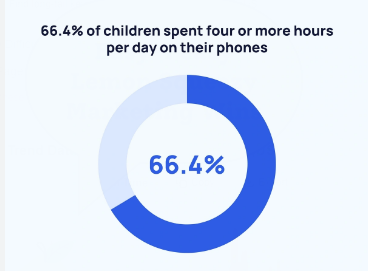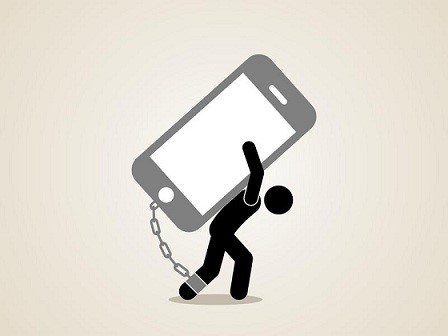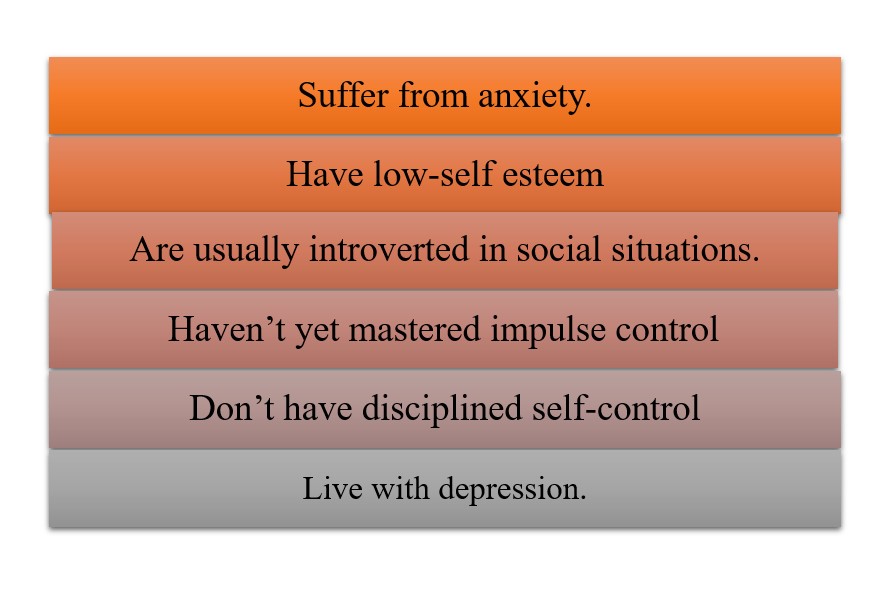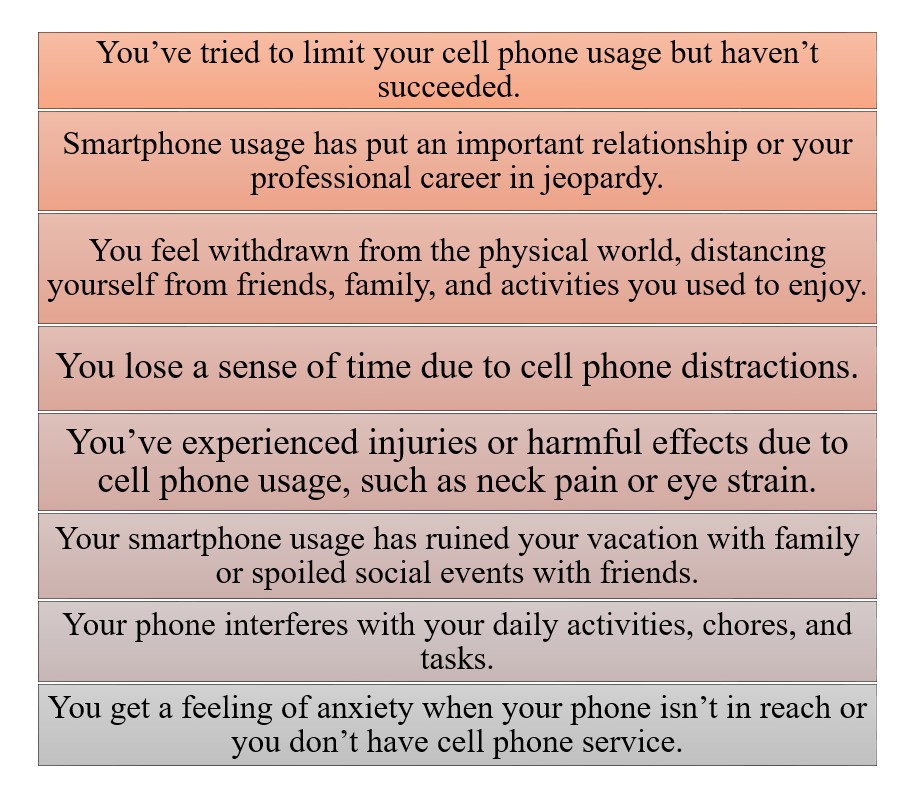The persistent and obsessive use of a mobile phone, even in the face of negative consequences such as tension, anxiety, and a reduced attention span, is known as phone addiction.
Nowadays, cell phones are becoming a necessary accessory for everyone.
So, your smartphone serves as your personal assistant, entertainment device, and navigator in the modern world.
Moreover, tablets and other connected devices have also become standard items in many households.
Research shows that Americans spend an average of five and a half hours a day.
After two consecutive years of declines, global smartphone shipments will grow 5% YoY in 2024 to reach 1.23 billion units, according to the latest forecast from Counterpoint’s Market Outlook Service.

Numerous owners of smartphones are able to control how long they stare at their screens. They are able to interact socially and remain aware of their surroundings even in the absence of the need to check their phone.
However, some users have developed a cell phone addiction. They find it difficult to engage with the world around them and prefer to spend social gatherings on their cell phones rather than talking to friends.
Since smartphones and other electronics have become global in our lives, it is critical to understand the signs of addiction and how to avoid them in order to maintain your mental and physical well-being.
What is Mobile Phone Addiction?

An obsession with smartphones is known as phone addiction.
The term “nomophobia,” or the dread of being without a mobile device, is frequently used to describe behavioral addiction.
People who are using mobile too much may experience worry, tension, and confusion.
There will be more than 6.8 billion smartphone users worldwide by 2024, and 6.3% of them will be addicted to their phones.
Virgin Mobile released research indicating that 427% more texts and notifications are received by those billions of smartphone users now than they were a decade ago.
Moreover, they text 278% more often. The increased usage of phones may seem like a necessary evil of contemporary living, but there are drawbacks and concerns as well.
The excessive usage of these gadgets is making users check their mobile usage patterns.
Who Is Most at Risk of Becoming Addicted to Their Cell Phone?
Anybody who uses a cell phone runs the risk of becoming dependent on it.
There are numerous ways that smartphone apps draw users in and make it difficult to look away, including through online gaming, social media, text messaging, and email.
However, compared to other age groups, teens have the highest risk of developing a cell phone addiction.
A study that was published in Frontiers in Psychiatry found that teenagers under the age of twenty are the most vulnerable to developing a cell phone addiction since they are more likely to have behavioral issues.
Teens can’t always manage screen time effectively and are dishonorable for using their phones excessively.
However, they are the generation that struggles to limit screen usage.
According to the same survey, almost 27% of smartphone owners between the ages of 11 and 14 never switch their devices off, not even for sleep.
This suggests that there may be no media management for teenagers.
Additional risk factors for smartphone addiction include those who:

Although problematic cell phone use is more common among teenagers, it can nevertheless cause problems in a person’s day-to-day activities.
If a user has any of these risk factors, they should make sure they continue to monitor how much time they spend on screens and can put down their phones when necessary.
What are the Symptoms of Cell Phone Addiction
Even though teens are more likely to use cell phones problematically, it can still interfere with daily tasks.
A user should make sure they can put down their phones as needed and continue to keep an eye on how much time they spend using screens if they have any of these risk factors.

Should you encounter any of these indications, it could indicate that you are on the path to developing a smartphone addiction.
It is imperative that you take the required actions to minimize your use of cell phones in order to avoid some of the more severe side effects linked to this issue.
Top Smartphone Addiction Stats 2024
Here are some of the eye-opening smartphone addiction stats:
- 9% of Americans acknowledge having a phone addiction.
- The average American looks at their smartphone 144 times a day, and 71% of Americans spend more time on it than on a love partner.
- Nearly two-thirds of kids use their smartphones for at least four hours every day. Anxiety is induced by not having a phone, according to 44% of American adults.
- Over 20% of auto accidents are caused by cell phones.
Side Effects of Mobile Phone Addiction
Overuse of smartphones has an impact on cognitive function, social engagement, and interactions, and mental and physical health.
Cognitive Effects
There may be an increase in distraction, cognitive interference, and interruptions when using smartphones. The simple presence of distractions can encourage compulsive smartphone use.
A contradiction is created by the congested environment of links and advertisements as well as the quick attention spans needed for scrolling, swiping, and tweeting: “an intensely focused state of distraction.
Even while it seems like a short-term diversion, it might have long-term consequences.
Price said, “This type of frequent, focused distraction isn’t just capable of creating long-lasting changes in our brains; it is particularly good at doing so.”Moreover, the casual act of checking one’s texts during a conversation is called phubbing.
However, Phubbing occurs rapidly when focus moves from an actual person to a virtual person.
A study shows that Phubbing has been linked with:
- Feelings of ostracism
- Negative mood
- Threatened fundamental needs
These effects were worse when phubbing occurred three times compared to just once.
Psychological Effects
Addiction to your phone might also impact your behavior, feelings, or ideas.
Studies have linked the following conditions to this kind of phone use:
- Alcohol use disorder
- Anxiety, including generalized and social anxiety
- Depression or depressed mood
- Impulsivity
- Low mental and psychological wellbeing
- Low self-esteem
- Obsessive-compulsive disorder (OCD)
- Post-traumatic stress disorder (PTSD)
- Shyness
How to Prevent Mobile Phone Addiction
There are several actions you can take to manage your use of smartphones and the internet.
Although many of these actions can be started by you, it can be difficult to overcome an addiction on your own, particularly when temptation is always present.
It can be very simple to return to previous usage patterns, so seek outside assistance from friends, family, or a therapist.
Encourage your family to set these rules:
- No phones at the dinner table.
- Turning off your phone for a few hours each day, during activities like working out or eating with your family.
- To prevent mobile phone addiction, you should:
- Monitor the amount of data you use and establish boundaries for your family.
- Get rid of the programs that you find yourself using most frequently, such social networking or gaming.
- Modify your phone’s settings to reduce the amount of alerts you get.
- Engage in hobby like painting that don’t involve your mobile phone.
Adjust how you use your smartphone, step-by-step
Most people find that controlling their use of smartphones and the internet doesn’t require them to give them up completely; rather, it should be approached more like going on a diet.
Since you probably still need to use your phone for work, school, or social interactions, your objective should be to reduce your use to more sensible amounts.
Set specific times for smartphone use, like after finishing tasks or at selected times of day.
Turn off your phone when driving, in meetings, at the gym, or during family time, and avoid bringing it to bed.
Moreover, screen time should be replaced with healthier activities like reading, meditating, or in-person conversations.
Remove social media apps to reduce mindless scrolling and comparison. Accept that limiting phone use means missing some updates, which can actually reduce stress.
Wrap Up
As we know we feel anxious without our phones and it is too difficult to prevent mobile phone addiction.
It requires conscious effort and setting healthy boundaries.
However, set limits on phone use, engage in more meaningful activities, and create a structured daily routine to reduce dependency on your phone.
Keep a balance between technology use and real-life interactions to lead a healthier life.



